




Applications of Computers in Hospitals and Their Types
Computers can perform multiple tasks with maximum efficiency, so they are used in hospitals for maintaining patient information, medical research, use in Surgical procedures, medical equipment, and Imaging.
Hospital information systems, data analysis in medicine, medical imaging laboratory computing, computer-aided medical decision-making, care of critically sick patients, computer-assisted therapy, and other applications are major uses of computers in medicine. Let’s learn about it further ahead.
Types of Computers Used in Hospitals
Desktop Computers: These are regular computers with a monitor, keyboard, and mouse. They are used by hospital staff for tasks like managing patient records, scheduling, and billing.
Laptop Computers: Laptops are portable and are used by doctors and nurses to move around the hospital while accessing patient data and updating records.
Tablets: Tablets are handheld devices that allow doctors and nurses to quickly access patient information, check medical records, or enter data at the patient’s bedside.
Servers: Servers store large amounts of hospital data, like patient records and test results, and help share this information across different departments.
Workstations: These are specialised computers that are used by doctors and medical professionals to view detailed medical images like X-rays, CT scans, and MRIs.
Medical Equipment Computers: Some hospital machines, like heart monitors, MRI machines, or ventilators, have built-in computers to monitor and control the equipment’s functions.
10 Uses of Computers in Hospitals
1. Maintain Patient Information
Patient information is kept organised, safe, and readily available on a computer. In an emergency, medical staff needs quick access to patient records. There are fewer risks of data loss or mismatching while using a computer.
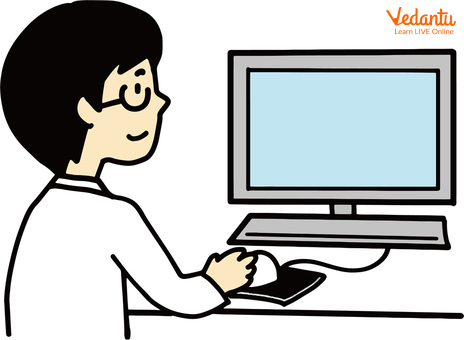
Patient Records in Hospital
2. Monitor Patients
Hospitals now utilise computers to keep track of vital signs like heart rate and blood pressure. Additionally, the computer monitoring system gathers helpful patient data. It is possible to retrieve this data for future use in research or other purposes.
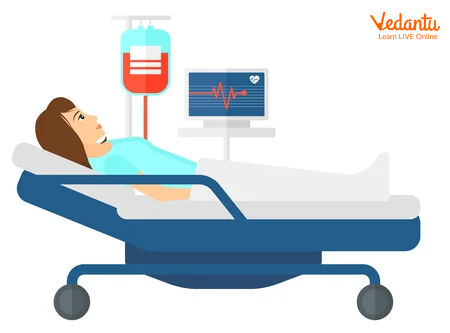
Monitoring Patients in Hospital
3. Medical Research
To understand more about a certain ailment, clinicians may now search medical databases. The ability of medical staff to obtain and apply knowledge is being improved through the use of computers in healthcare.

Medical Research in Hospital
4. Inventory
Knowing what medications are on hand is crucial for a patient's therapy. The rehabilitation process might be slowed down if a doctor prescribes a medication that is out of stock, thus it is essential to keep an inventory list up to date. In the meanwhile, inventory control is crucial for hospitals and medical facilities. Therefore, inventory managers can track stock levels thanks to computers.

Inventory in Hospital.
5. Use in Surgical Procedures
Computers are capable of performing multiple tasks with precision, so the use of computers in operating rooms can save lives. For completing complicated treatments, surgeons rely on computers.
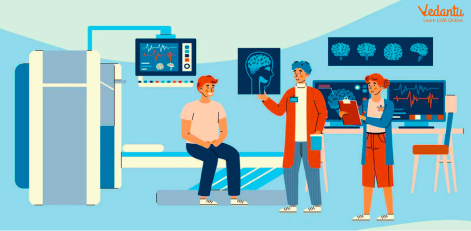
Use of Computer in a Hospital.
6. Medical Equipment and Imaging
Computers are widely used to operate medical machinery that conducts crucial medical tests including ultrasonography, CT scans, MRIs, blood tests, etc. Doctors also utilise computers to display their findings and describe the illness and course of therapy. Computers may be used for 3D modelling and drawing.
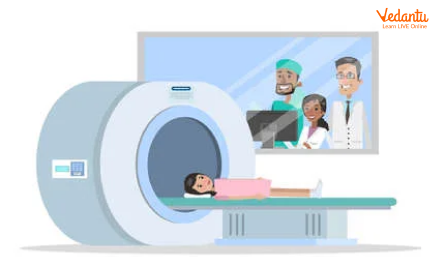
Computer Imaging in Hospital
7. Communication
The use of computers for communication amongst healthcare professionals helps the staff and makes their job easier because they are sometimes quite busy. Healthcare staff can communicate in real-time chat on a computer to share important information. It is preferable than receiving texts or post-it notes.

Communication in Hospital
8. Telemedicine
The act of treating patients remotely while neither the patient nor the practitioner is present physically is considered to be telemedicine. Doctors may now connect with patients and other medical personnel thanks to computers and cell phones. During natural calamities, telemedicine is crucial as well.
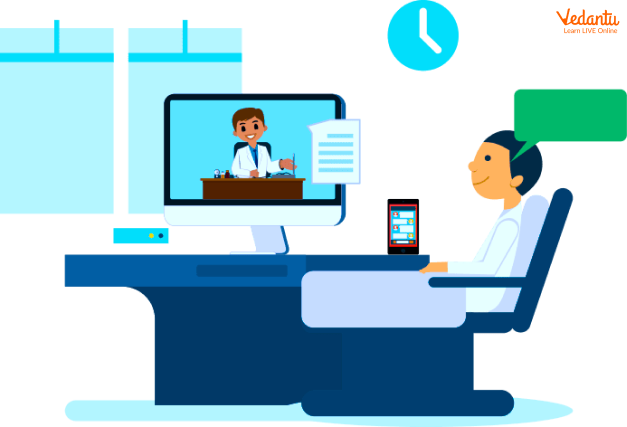
Telemedicine in Hospital
9. Customer Services
Hospitals now use automated systems like Artificial Intelligence (AI) to provide regular customer services to the patients (like payments, making demands, and complaints).

Customer Services on a Computer in Hospital
10. Online Payment
Hospitals now make use of online payment portals to enable patients to pay their hospital bills online. This reduces the chances of errors and the task is performed in minimum time.

Online Payments in Hospital
Solved Questions
1. How do computers help doctors to treat patients?
Ans: Computers are very useful for doctors to treat their patients as they help in maintaining important patient information, monitoring patients, performing surgical procedures, and helping with medical equipment and imaging.
2. How are computers used in scans?
Ans: Computers are widely used to operate medical machinery that conducts crucial medical tests including ultrasonography, CT scans, MRIs, blood tests, etc. Doctors also utilise computers to display their findings and describe the illness and course of therapy. Computers may be used for 3D modelling and drawing.
3. What is telemedicine?
Ans: Doctors may now connect with patients and other medical personnel thanks to computers and cellphones. The act of treating patients remotely while neither the patient nor the practitioner is present physically is considered to be telemedicine. During natural calamities, telemedicine is crucial as well.
Learning by Doing
Choose the Correct Answer.
In hospitals, what of the following are computers used for?
Play music
Research
Teach students
How does a computer help a doctor treat their patients?
(A) Computer maintains the record of a patient.
(B) With the aid of computers, doctors examine the internal organs of the patient.
(C) Both (A) and (B)
(D) None of these.
Write True or False:
1. In hospitals, computers are used to detect illnesses. (T/F)
2. Computers used in Scans. (T/F)
3. Computers do not help in Surgical Procedures. (T/F)
4. Computers do not help to monitor patients. (T/F)
Learning about computers is so fun yet interesting, Kids can learn about computers from the start and can use Computer Basics, which is a simple and helpful guide to understand them better.
Summary
In hospitals, computers are utilised to detect illnesses and analyse the human body's interior organs. Computers are used to perform CAT scans, imaging, ultrasound, surgery, post-operative care, and eye diagnostics. They are also used to preserve patient data, track development, and locate treatments. Hospital information systems, data analysis in medicine, medical imaging laboratory computing, computer-aided medical decision-making, care of critically sick patients, computer-assisted therapy, and other applications are among the major uses of computers in medicine. Hence, it is evident that computers form an integral part of a smooth functioning hospital or diagnostic centre.
FAQs on Uses of Computers in Hospital
1. What are the main uses of computers in a hospital setting?
Computers are integral to modern hospitals and are primarily used for several key functions. These include:
Patient Data Management: Storing and managing Electronic Health Records (EHRs) for quick access to patient history and treatment plans.
Medical Imaging: Processing and analysing images from diagnostic tools like MRI, CT scans, and X-rays.
Patient Monitoring: Tracking vital signs such as heart rate and blood pressure continuously through connected devices.
Surgical Assistance: Aiding surgeons with high precision in robotic-assisted surgeries and surgical navigation.
Communication: Facilitating seamless communication between doctors, nurses, and different departments.
Medical Research: Analysing large datasets of patient information to identify trends and improve treatments.
2. How do computers help in monitoring a patient's health in real-time?
Computers play a crucial role in real-time patient monitoring by connecting to various medical devices. They continuously track a patient's vital signs, such as heart rate, blood pressure, oxygen saturation, and respiratory rate. This data is displayed on monitors at the nursing station and can be programmed to trigger alarms if any reading falls outside a safe range, alerting healthcare staff to potential issues immediately. This allows for prompt intervention and improves patient safety, especially in intensive care units (ICUs).
3. What different types of computers are typically found in a modern hospital?
A modern hospital uses various types of computers tailored for specific tasks. These include desktop computers at reception and administrative offices for billing and scheduling, workstations on wheels (WOWs) or tablets used by doctors and nurses for accessing patient records at the bedside, and powerful servers that manage the hospital's entire data network. Furthermore, many critical medical devices, like MRI machines and ventilators, have their own embedded computers that control their functions.
4. In what ways are computers used in a hospital's pharmacy?
In a hospital pharmacy, computers are essential for ensuring medication safety and efficiency. Their applications include prescription management, where they record and track medication orders from doctors. They also manage inventory control by automatically tracking drug supplies and reordering when necessary. Crucially, pharmacy software uses computer systems to cross-reference prescriptions with a patient's records to check for potential drug allergies or harmful interactions, significantly reducing the risk of error.
5. How do nurses specifically use computers in their daily tasks?
Nurses use computers for a wide range of tasks that streamline patient care. A primary use is for charting and documentation in the Electronic Health Record (EHR), where they record vital signs, observations, and care provided. They also use computers for medication administration, often scanning barcodes on patient wristbands and medications to ensure the right patient receives the correct dose. Additionally, computers help in managing schedules, communicating with other medical staff, and accessing educational resources for patient care.
6. Beyond basic record-keeping, how has telemedicine, powered by computers, changed how doctors treat patients in remote areas?
Telemedicine has fundamentally transformed healthcare access for remote patients. Powered by computers and the internet, it allows for virtual consultations via video conferencing, eliminating the need for patients to travel long distances. Doctors can remotely access a patient's test results and images, provide diagnoses, and prescribe treatments. Furthermore, specialists from urban centres can guide local healthcare providers through complex cases, effectively bringing expert care to otherwise underserved regions.
7. What is the difference between computer use in clinical diagnosis versus hospital administration?
The use of computers differs significantly between these two areas. In clinical diagnosis, computers are directly involved in patient care. They process complex data from diagnostic equipment like MRI and CT scanners, help analyse lab results, and run software that can identify patterns indicative of specific diseases. In contrast, in hospital administration, computers are used for business and operational tasks. This includes patient billing, scheduling appointments, managing staff payroll, ordering supplies, and maintaining the overall operational flow of the hospital.
8. How does the data collected by hospital computers contribute to larger medical research?
The vast amounts of anonymised data collected by hospital computers are a valuable resource for medical research. Researchers can analyse this big data to identify patterns in diseases, evaluate the effectiveness of different treatments across a large population, and predict public health trends or outbreaks. This data-driven approach helps in developing new medical protocols, improving drug efficacy, and creating more effective public health policies, ultimately benefiting the entire society.
9. What are the key advantages of using Electronic Health Records (EHRs) over traditional paper-based systems in hospitals?
Using Electronic Health Records (EHRs) offers significant advantages over paper-based systems. The primary benefit is instant access, allowing multiple authorised doctors and nurses to view a patient's complete history simultaneously from different locations. EHRs also reduce errors by eliminating issues with illegible handwriting and by providing automated alerts for allergies or drug interactions. They improve care coordination between departments and enhance security through controlled access, which is often more robust than securing physical paper files.
10. Can computers assist in complex surgical procedures? If so, how?
Yes, computers are crucial in assisting with complex surgeries. One of the most important applications is robotic-assisted surgery, where a surgeon controls highly precise robotic arms to perform minimally invasive procedures. This results in smaller incisions, less pain, and faster recovery for the patient. Computers also power surgical navigation systems, which act like a GPS for the surgeon, providing real-time 3D visualisations of the surgical area based on pre-operative scans, thereby increasing accuracy and safety.











